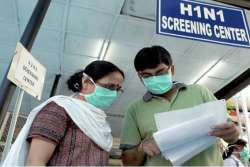Kerala: 7 children in Kozhikode school diagnosed with H1N1 swine flu
Children of a school in Kerala's Kozhikode have been diagnosed with swine flu. The children had complained of fever after which their blood samples were sent for test. The test later confirmed H1N1 (swine flu).

At least 7 students from a school in Kerala's Kozhikode were diagnosed with H1N1 (swine flu). The H1N1 cases were confirmed by the Manipal Institute of Virology after a test of the blood samples of the children. Earlier this year, more than 170 people, including students and teachers in the school had complained of fever. Their blood samples were later collected for a laboratory test, which confirmed the symptoms of swine flu.
The state health minister paid a visit to the students who had sent their blood samples for test. Manipal Institute of Virology, which confirmed the swine flu cases had also confirmed the spread of Nipah virus in 2018.
Since January 1, 2020, the Anayamkunnu higher secondary school has reported 176 cases of fever. Following this, a two-day holiday (on January 2 and 3) was announced at the school.
What is swine flu
Swine influenza is an infection caused by any one of several types of swine influenza viruses. Swine influenza virus (SIV) or swine-origin influenza virus (S-OIV) is any strain of the influenza family of viruses that is endemic in pigs. Swine flu was initially seen in humans in Mexico in 2009, where the strain of the particular virus was a mixture of 3 types of strains.
The swine influenza virus is common throughout pig populations worldwide. Transmission of the virus from pigs to humans is not common and does not always lead to human flu, often resulting only in the production of antibodies in the blood. If transmission does cause human flu, it is called zoonotic swine flu. People with regular exposure to pigs are at increased risk of swine flu infection.
Symptoms of swine flu
In humans, the symptoms of the swine flu H1N1 virus are similar to those of influenza and of influenza-like illness in general. Symptoms include fever, cough, sore throat, watery eyes, body aches, shortness of breath, headache, weight loss, chills, sneezing, runny nose, coughing, dizziness, abdominal pain, lack of appetite and fatigue.
Also Read | Satellite and drone images predicts how a tropical disease spreads